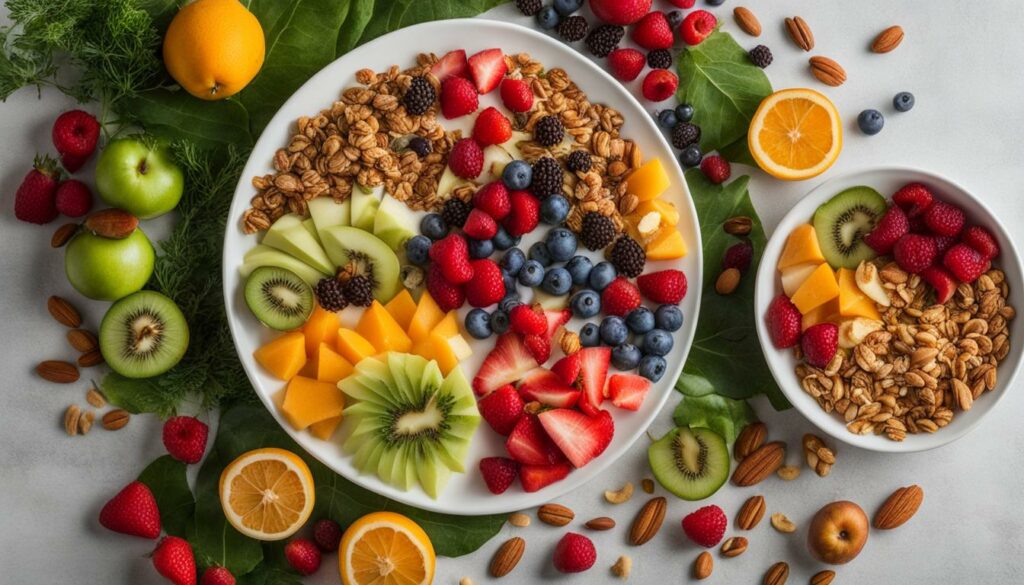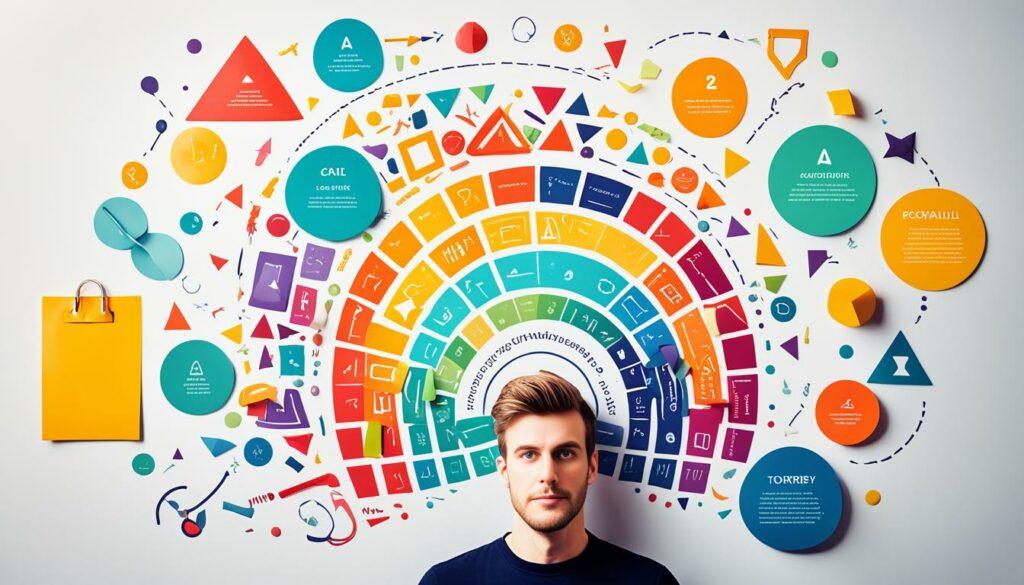Did you know that over 6.1 million adults in the United States are living with attention deficit hyperactivity disorder (ADHD) without relying on medication? That’s nearly 2% of the adult population! Despite the prevalence of ADHD, many individuals have found effective strategies and tips to manage their symptoms without medication.
In this article, we will explore various non-medication approaches for living with ADHD, from lifestyle changes to behavioral modifications and integrative medicine. Whether you are already on medication and looking for additional support or prefer a medication-free approach, these strategies and tips can help you navigate the challenges of ADHD and enhance your overall well-being.
Key Takeaways:
- ADHD affects over 6.1 million adults in the United States.
- Many individuals with ADHD successfully manage their symptoms without medication.
- In this article, we will explore non-medication approaches for living with ADHD.
- These strategies and tips can improve overall well-being and enhance ADHD management.
- Individualized treatment plans should be developed in collaboration with healthcare professionals.
Non-Medication Approaches for ADHD Management
While medication is commonly prescribed to manage ADHD symptoms, there are alternative treatment options that can be explored. These non-medication approaches take a holistic approach to ADHD management, focusing on lifestyle changes and natural remedies to help individuals cope with ADHD naturally. Incorporating these strategies into daily life can provide additional support and complement traditional treatment methods.
Exercise and Outdoor Time
Regular exercise has shown to have positive effects on ADHD symptoms. Engaging in cardio exercises, such as running, swimming, or cycling, can help improve executive function, attention, and reduce impulsivity. Additionally, spending time outdoors and in nature has been found to have a calming and positive impact on individuals with ADHD. Nature walks, hiking, or simply spending leisure time in green spaces can contribute to better overall well-being and help manage ADHD symptoms.
Sleep Routine and Daylight Exposure
Establishing a regular sleep routine helps regulate sleep schedules and promotes better rest. Adequate sleep is essential for individuals with ADHD as it can help improve focus and reduce hyperactivity. In addition to a consistent sleep routine, optimizing daylight exposure is important. Spending time in natural light during the day and ensuring a dark, quiet environment for sleep can help regulate circadian rhythms and improve overall sleep quality.
By embracing non-medication approaches like exercise, outdoor time, and prioritizing sleep, individuals with ADHD can adopt holistic strategies to manage their symptoms. These approaches can be implemented alongside other ADHD management techniques to create a comprehensive treatment plan tailored to the individual’s needs and preferences.
| Non-Medication Approaches for ADHD Management | Benefits |
|---|---|
| Regular exercise | – Improves executive function – Enhances attention – Reduces impulsivity |
| Outdoor time | – Calming effect on ADHD symptoms – Provides positive sensory experiences – Supports overall well-being |
| Sleep routine | – Regulates sleep schedules – Improves focus – Reduces hyperactivity |
| Daylight exposure | – Regulates circadian rhythms – Improves overall sleep quality |
Behavior Modifications for ADHD Support
Living with ADHD presents unique challenges, and traditional productivity tips may not always be effective for individuals with this condition. Thankfully, there are several behavior modifications and self-care methods that can help manage ADHD symptoms and improve productivity.
Starting Small and Using Timers
ADHD individuals often struggle with task initiation and focus. To overcome this, it’s helpful to start small by breaking down tasks into manageable steps. Setting achievable goals allows for a sense of accomplishment and helps build momentum. Additionally, using timers can create a structured framework for tasks, promoting focus and helping manage time efficiently.
Having a Body Double
A body double is someone who simply provides a physical presence and moral support during challenging tasks. Having someone present can help individuals with ADHD maintain focus, resist distractions, and stay accountable.
Automatic and Visible Reminders
Utilizing technology can be beneficial for managing tasks and appointments. Setting up automatic reminders on smartphones or computers helps individuals remember important deadlines and obligations. Additionally, using visible reminders, such as sticky notes or a whiteboard, can serve as visual cues to prompt action and maintain focus.
Reorganizing the Home and Seeking ADHD Coaching
The environment plays a crucial role in managing ADHD symptoms. Keeping living spaces organized and clutter-free minimizes distractions and promotes focus. Seeking the help of an ADHD coach can provide valuable guidance and strategies for effectively managing tasks and daily routines, enhancing overall productivity.
Summary
Implementing behavior modifications and self-care methods can greatly improve the management of ADHD symptoms and enhance productivity. Strategies such as starting small, utilizing timers, having a body double, setting reminders, and reorganizing the home can provide valuable support. Additionally, enlisting the help of an ADHD coach can offer personalized guidance and accountability. By incorporating these techniques, individuals with ADHD can effectively navigate their daily responsibilities and achieve their goals.
Nutrition and Dietary Considerations for ADHD
While diet alone may have limited evidence in helping adults with ADHD, research suggests that nutritionally balanced diets can play a role in managing ADHD symptoms, particularly in children. Two diets that have been linked to reduced ADHD symptoms are the Mediterranean and DASH diets.
The Mediterranean diet is rich in fruits, vegetables, whole grains, lean proteins, and healthy fats like olive oil. It emphasizes consuming omega-3 fatty acids found in fish, nuts, and seeds. Research shows that incorporating these elements into the diet may have a positive impact on ADHD symptoms.
The DASH (Dietary Approaches to Stop Hypertension) diet focuses on reducing sodium and increasing the consumption of fruits, vegetables, whole grains, and low-fat dairy products. This diet has been associated with improved cognitive function and reduced symptoms of ADHD in children.
Additionally, some studies suggest that individuals with ADHD may be more prone to vitamin and mineral deficiencies. Specifically, deficiencies in vitamin B2 (riboflavin), vitamin B6 (pyridoxine), and vitamin B9 (folate) have been observed. These deficiencies may contribute to the manifestation and severity of ADHD symptoms.
Furthermore, research has shown a possible link between polyunsaturated fatty acids, such as Omega-3, and ADHD symptoms. Omega-3 fatty acids are found in fatty fish, walnuts, flaxseeds, and chia seeds. However, the effect of polyunsaturated fatty acids on ADHD symptoms is considered to be modest.
While diet alone may not be a cure for ADHD, incorporating these nutritional considerations into a comprehensive treatment plan can potentially contribute to the management of symptoms.
Dietary Recommendations for ADHD
- Increase consumption of fruits and vegetables to ensure an adequate intake of vitamins and minerals.
- Incorporate foods rich in omega-3 fatty acids, such as fatty fish (salmon, mackerel), walnuts, flaxseeds, and chia seeds, into the diet.
- Consider supplementation with vitamins B2, B6, and B9 under the guidance of a healthcare professional.
- Limit processed foods, sugary snacks, and foods high in artificial additives, as they may exacerbate ADHD symptoms.
- Stay hydrated by drinking enough water throughout the day.
It is important to note that dietary changes should be made in consultation with a healthcare professional or a registered dietitian. They can provide personalized recommendations and ensure that any dietary modifications align with an individual’s specific nutritional needs.

Psychotherapy and Behavioral Therapy for ADHD
Psychotherapy and behavioral therapy are instrumental in effectively managing ADHD. These therapies not only provide valuable coping skills but also assist in regulating emotions and addressing the negative messaging and stigma often associated with ADHD. Additionally, behavioral therapy focuses specifically on managing behaviors that can interfere with daily life.
Through psychotherapy, individuals with ADHD can develop strategies to cope with challenges and build resilience. Therapy sessions offer a safe space to address emotional struggles, improve self-esteem, and enhance overall well-being.
“Psychotherapy acts as a catalyst for change by helping individuals navigate their unique ADHD journey. It equips them with coping mechanisms and empowers them to lead fulfilling lives.”
Behavioral therapy, on the other hand, concentrates on modifying specific behaviors that impact academic performance, work productivity, and personal relationships. Techniques such as goal setting, time management, and organizational skills form the foundation of behavioral therapy.
As people with ADHD often face challenges related to self-regulation and impulse control, behavioral therapy provides tools to manage these difficulties effectively. By implementing behavioral strategies and interventions, individuals can improve focus, attention span, and recall abilities.
“Behavioral therapy empowers individuals with ADHD to take control of their actions, enabling them to thrive in various areas of their lives.”
In addition to therapy sessions, ADHD support groups play a vital role in the management and support of individuals with ADHD. These groups provide a supportive community and a platform for sharing experiences, tips, and resources.
Whether online or in-person, ADHD support groups create a sense of belonging, reduce feelings of isolation, and provide valuable insights into managing ADHD in different contexts. Group members often share coping strategies, suggest helpful tools and techniques, and offer emotional support.
The Benefits of Psychotherapy and Behavioral Therapy for ADHD:
- Development of coping skills to manage daily challenges
- Regulation of emotions and improvement of overall well-being
- Addressing negative messaging and reducing ADHD-related stigma
- Focusing on specific behaviors that interfere with daily life
- Promoting self-regulation and impulse control
- Improving focus, attention span, and recall abilities
- Creating a supportive community through ADHD support groups
- Sharing experiences, tips, and resources
- Reducing feelings of isolation and fostering a sense of belonging

Psychotherapy for ADHD, combined with behavioral therapy and participation in ADHD support groups, offers comprehensive support and resources for individuals living with ADHD. By utilizing these valuable tools, individuals can cultivate coping skills, manage behaviors, regulate emotions, and build a strong support network.
Integrative Medicine and Natural Remedies for ADHD
Integrative medicine approaches and natural remedies can be effective complements to traditional ADHD treatment. By focusing on lifestyle changes, such as diet and sleep, and implementing strategies to support brain function, individuals with ADHD can optimize their treatment and enhance the effectiveness of medication.
One important consideration in managing ADHD is addressing nutrient deficiencies. Research suggests that individuals with ADHD may be more prone to deficiencies in vitamins and minerals such as vitamin B2, B6, and B9. By incorporating foods rich in these nutrients into their diet or considering supplementation, individuals can support overall brain health and potentially improve ADHD symptoms.
“Addressing nutrient deficiencies, detoxification, and decreasing exposure to excitotoxins are all important considerations.”
In addition, detoxification is another key aspect of integrative medicine for ADHD. By reducing exposure to excitotoxins, which are substances that overstimulate brain cells, individuals can support their brain’s natural detoxification processes. This can be achieved by avoiding processed foods, artificial additives, and certain chemicals present in the environment.
A consistent and adequate sleep schedule is also vital in managing ADHD symptoms. Research has shown that establishing a regular sleep routine and optimizing sleep duration can help regulate attention and reduce hyperactivity. It is recommended to create a calming bedtime routine and ensure a quiet and comfortable sleep environment to promote restful sleep.
Spending time outside in nature can also have a positive impact on ADHD symptoms. Studies have suggested that exposure to natural surroundings can enhance focus and attention, providing a respite from the demands of daily life. Incorporating outdoor activities into daily routines, such as walking or gardening, can offer both physical exercise and mental relaxation.
Another approach to optimizing ADHD treatment is increasing antioxidant intake. Antioxidants help protect brain cells from oxidative stress and inflammation, which are thought to contribute to ADHD symptoms. Including foods rich in antioxidants, such as berries, leafy greens, and nuts, can provide a natural boost to brain health.
It is important to note that integrative medicine and natural remedies should not replace prescribed medication or therapy for ADHD. Instead, they can be utilized as a holistic approach to support the management of ADHD symptoms in conjunction with conventional treatment options.

Key Takeaways:
- Integrative medicine and natural remedies can complement traditional ADHD treatment.
- Addressing nutrient deficiencies and detoxification are important considerations in managing ADHD.
- A consistent sleep schedule, spending time in nature, and increasing antioxidant intake can support ADHD management.
- Integrative medicine should be used as a holistic approach in combination with prescribed medication and therapy.
Importance of Individualized Treatment for ADHD
Living with ADHD can present unique challenges for each individual. No two people experience ADHD in the same way, which is why personalized and individualized treatment is essential. It is crucial to find the right approach that works best for managing ADHD symptoms effectively. This can involve a combination of strategies, including medication, therapy, lifestyle adjustments, and effective coping techniques.
Working closely with healthcare professionals is key to developing a personalized treatment plan. They can provide valuable insights and guidance based on their expertise and knowledge of ADHD management. Together, you can explore various treatment options and tailor a plan that suits your specific needs and goals.
Personalized ADHD management may incorporate medication as part of the treatment plan. Medication can help improve focus, reduce impulsivity, and enhance overall functioning. However, it is important to remember that medication is not the only solution and may not be suitable for everyone. In some cases, non-medication approaches, such as therapy, lifestyle changes, and alternative treatments, may be more appropriate and effective in managing ADHD symptoms.
Therapy, particularly behavioral therapy and psychotherapy, can play a significant role in ADHD management. These therapies can help individuals develop coping skills, regulate emotions, and address any underlying psychological factors that may contribute to ADHD symptoms. Additionally, support groups and peer networks offer valuable resources and a sense of community for individuals living with ADHD.
When it comes to lifestyle adjustments, finding effective strategies for managing ADHD is crucial. This may involve implementing organizational techniques, optimizing sleep patterns, incorporating exercise, and adopting healthy eating habits. Different individuals may find different strategies more effective, and it is essential to explore and experiment with various approaches to find what works best for you.
Benefits of Individualized Treatment for ADHD
Individualized treatment for ADHD offers several distinct benefits:
- Targeted Approach: By tailoring the treatment plan to your unique needs, it becomes more targeted and specific to address your specific challenges and goals.
- Increased Effectiveness: When treatment is personalized, it is more likely to be effective in managing ADHD symptoms, maximizing your overall well-being and quality of life.
- Improved Engagement: Taking an individualized approach increases your engagement and commitment to the treatment plan, as it aligns with your personal preferences and goals.
- Long-Term Success: By working collaboratively with healthcare professionals to create a personalized treatment plan, you are setting yourself up for long-term success in managing your ADHD.
“The key to effectively managing ADHD lies in recognizing that each individual experience is unique. By embracing personalized treatment, individuals can find the strategies and approaches that work best for them.”
Remember, there is no one-size-fits-all solution for managing ADHD. By embracing individualized treatment, you can improve your ability to cope with ADHD symptoms and live a fulfilling and productive life.

Conclusion
Living well with ADHD is achievable through holistic management strategies and comprehensive treatment approaches. While medication can be beneficial for some individuals, it is not the only option available. By optimizing their ADHD lifestyle, individuals can experience significant improvements in their symptoms and overall well-being.
Implementing lifestyle changes is a key component of holistic ADHD management. Regular exercise, such as cardio workouts, has been shown to improve executive function and reduce impulsivity in individuals with ADHD. Additionally, paying attention to nutrition and maintaining a balanced diet can support brain health and minimize ADHD symptoms.
Addressing behavioral modifications is also crucial for optimizing ADHD lifestyle. Creating a structured routine, using timers and reminders, and enlisting the support of an ADHD coach can help individuals effectively manage tasks and enhance productivity. It’s important to remember that everyone’s ADHD journey is unique, so finding strategies that work best for each individual is essential.
Collaborating with healthcare professionals is essential in creating a comprehensive ADHD treatment plan. The personalized approach takes into account individual needs and goals. By combining medication, therapy, and lifestyle adjustments, individuals can develop a holistic treatment plan that supports their overall well-being and empowers them to live well with ADHD.
